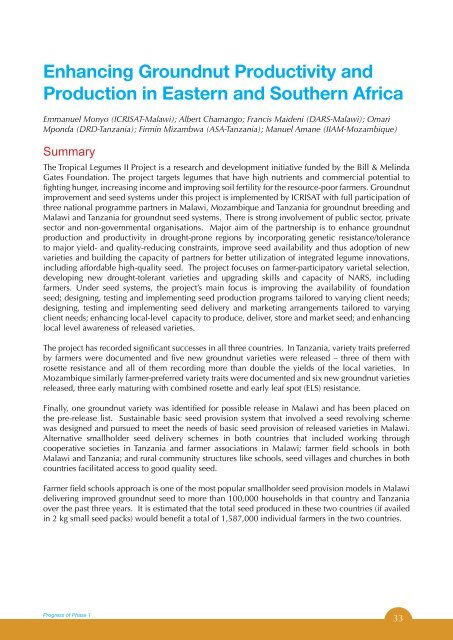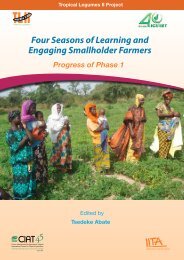Four Seasons of Learning and Engaging Smallholder Farmers - icrisat
Four Seasons of Learning and Engaging Smallholder Farmers - icrisat
Four Seasons of Learning and Engaging Smallholder Farmers - icrisat
You also want an ePaper? Increase the reach of your titles
YUMPU automatically turns print PDFs into web optimized ePapers that Google loves.
Enhancing Groundnut Productivity <strong>and</strong><br />
Production in Eastern <strong>and</strong> Southern Africa<br />
Emmanuel Monyo (ICRISAT-Malawi); Albert Chamango; Francis Maideni (DARS-Malawi); Omari<br />
Mponda (DRD-Tanzania); Firmin Mizambwa (ASA-Tanzania); Manuel Amane (IIAM-Mozambique)<br />
Summary<br />
The Tropical Legumes II Project is a research <strong>and</strong> development initiative funded by the Bill & Melinda<br />
Gates Foundation. The project targets legumes that have high nutrients <strong>and</strong> commercial potential to<br />
fighting hunger, increasing income <strong>and</strong> improving soil fertility for the resource-poor farmers. Groundnut<br />
improvement <strong>and</strong> seed systems under this project is implemented by ICRISAT with full participation <strong>of</strong><br />
three national programme partners in Malawi, Mozambique <strong>and</strong> Tanzania for groundnut breeding <strong>and</strong><br />
Malawi <strong>and</strong> Tanzania for groundnut seed systems. There is strong involvement <strong>of</strong> public sector, private<br />
sector <strong>and</strong> non-governmental organisations. Major aim <strong>of</strong> the partnership is to enhance groundnut<br />
production <strong>and</strong> productivity in drought-prone regions by incorporating genetic resistance/tolerance<br />
to major yield- <strong>and</strong> quality-reducing constraints, improve seed availability <strong>and</strong> thus adoption <strong>of</strong> new<br />
varieties <strong>and</strong> building the capacity <strong>of</strong> partners for better utilization <strong>of</strong> integrated legume innovations,<br />
including affordable high-quality seed. The project focuses on farmer-participatory varietal selection,<br />
developing new drought-tolerant varieties <strong>and</strong> upgrading skills <strong>and</strong> capacity <strong>of</strong> NARS, including<br />
farmers. Under seed systems, the project’s main focus is improving the availability <strong>of</strong> foundation<br />
seed; designing, testing <strong>and</strong> implementing seed production programs tailored to varying client needs;<br />
designing, testing <strong>and</strong> implementing seed delivery <strong>and</strong> marketing arrangements tailored to varying<br />
client needs; enhancing local-level capacity to produce, deliver, store <strong>and</strong> market seed; <strong>and</strong> enhancing<br />
local level awareness <strong>of</strong> released varieties.<br />
The project has recorded significant successes in all three countries. In Tanzania, variety traits preferred<br />
by farmers were documented <strong>and</strong> five new groundnut varieties were released – three <strong>of</strong> them with<br />
rosette resistance <strong>and</strong> all <strong>of</strong> them recording more than double the yields <strong>of</strong> the local varieties. In<br />
Mozambique similarly farmer-preferred variety traits were documented <strong>and</strong> six new groundnut varieties<br />
released, three early maturing with combined rosette <strong>and</strong> early leaf spot (ELS) resistance.<br />
Finally, one groundnut variety was identified for possible release in Malawi <strong>and</strong> has been placed on<br />
the pre-release list. Sustainable basic seed provision system that involved a seed revolving scheme<br />
was designed <strong>and</strong> pursued to meet the needs <strong>of</strong> basic seed provision <strong>of</strong> released varieties in Malawi.<br />
Alternative smallholder seed delivery schemes in both countries that included working through<br />
cooperative societies in Tanzania <strong>and</strong> farmer associations in Malawi; farmer field schools in both<br />
Malawi <strong>and</strong> Tanzania; <strong>and</strong> rural community structures like schools, seed villages <strong>and</strong> churches in both<br />
countries facilitated access to good quality seed.<br />
Farmer field schools approach is one <strong>of</strong> the most popular smallholder seed provision models in Malawi<br />
delivering improved groundnut seed to more than 100,000 households in that country <strong>and</strong> Tanzania<br />
over the past three years. It is estimated that the total seed produced in these two countries (if availed<br />
in 2 kg small seed packs) would benefit a total <strong>of</strong> 1,587,000 individual farmers in the two countries.<br />
Progress <strong>of</strong> Phase 1<br />
33

















